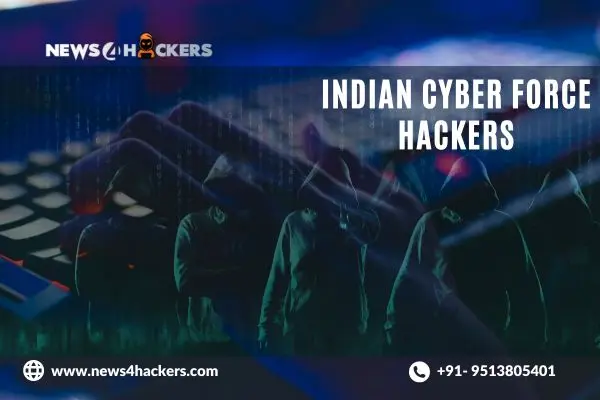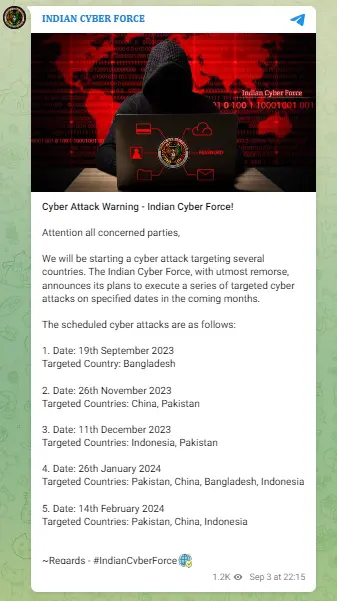Indian Cyber Force Hackers Reveal Schedule for Planned Cyber Assaults on Pakistan and China

The threat actor states to have specific Cyber assault plans involving dates and times for these nations.
The group known as the Indian Cyber Force (ICF) has asserted responsibility for a sequence of planned cyber assaults on vital infrastructure across several countries, including Bangladesh, China, Pakistan, and Indonesia.
The aforementioned entity, renowned for its expertise inside the dark web hacking community, has disclosed its forthcoming assault timetable up until February 14, 2024, using its designated dark web platform, “INDIAN CYBER FORCE.”

Image Showing “Indian Cyber Force” Cyber Attack Timeline
As per the assertions made by the threat actor, they have disclosed a comprehensive strategy for specifically targeting the aforementioned nations. Additionally, they have specified precise dates and times for the commencement of their offensive assault against each respective country.
The cyber attack schedule, ascribed to the ICF, encompasses the subsequent events: Bangladesh was identified as the target on September 19, 2023. Subsequently, on November 26, 2023, the attention will transition towards China and Pakistan.
On December 11, 2023, Indonesia and Pakistan saw a series of strikes. Following this, it is anticipated that on January 26, 2024, the malevolent entity intends to focus its efforts on Pakistan, China, Bangladesh, and Indonesia.
The cyberattacks targeting Pakistan, China, and Indonesia have been scheduled for February 14, 2024. These discoveries highlight the boldness of the hackers and their willingness to confront cybersecurity specialists.
The Indian Cyber Force hackers have made claims regarding their cyberattack.
Although the Indian Cyber Force hackers have made assertive declarations, the veracity of their assertions has yet to be substantiated. As previously stated, the aforementioned enigmatic collective has declared its intention to focus its efforts on prominent multinational firms and governmental entities worldwide.
In July 2023, the Indian Cyber Force hackers garnered attention for their successful infiltration of the website belonging to an Indonesian PetroChemical Corporation. The specific technique utilized in this cyber intrusion remains undisclosed; however, the collective has hinted at the forthcoming publication of the breached database.
In light of the aforementioned dangers, the BGD E-Gov CIRT has issued a cautionary notice in conjunction with several organizations, including the Bangladesh Bank. Numerous institutions, particularly those in the financial sector, have implemented preemptive strategies aimed at mitigating prospective losses.
The officials of the BGD E-Gov CIRT maintain a state of vigilance, underscoring the ongoing presence of potential attack risks. There have been documented cases of cyber attack incidents, one of which involved the addition of illegal information to the biography of a former officer on the website of Chittagong Customs House.
In addition, the International Cybersecurity Federation (ICF) has asserted accountability for its deliberate actions against the e-ticketing platform of Bangladesh Railway, resulting in a disruption lasting for a duration of one hour. The aforementioned gang also claimed responsibility for a cyber assault on the ticketing service provider “Shohoz,” resulting in interruptions to transit services. Nevertheless, Shohoz has refuted these accusations of hacking.
In a correlated occurrence, cyber attackers temporarily disrupted the functionality of the website flyticket.com.bd, resulting in its unavailability for a duration of one hour. Concurrently, a message was shown on the website stating, “Regrettably, no flights are available today.”
The escalating concerns of cyber attacks originating from the Indian Cyber Force have prompted authorities to enhance security measures inside the banking and financial sectors in accordance with government alerts.
While certain experts in the field of cybersecurity have a positive outlook regarding the ability to address these dangers, they uniformly emphasize the pressing need to strengthen security protocols and fortify digital transactions in order to deter possible breaches.
About The Author:
Yogesh Naager is a content marketer who specializes in the cybersecurity and B2B space. Besides writing for the News4Hackers blog, he’s also written for brands including CollegeDunia, Utsav Fashion, and NASSCOM. Naager entered the field of content in an unusual way. He began his career as an insurance sales executive, where he developed an interest in simplifying difficult concepts. He also combines this interest with a love of narrative, which makes him a good writer in the cybersecurity field. In the bottom line, he frequently writes for Craw Security.
Read More Article Here:
Pune man lost funds to fraud after investing online ₹18 lakhs to earn a commission.
To tackle impersonation, X (Twitter) will gather biometric information from its paid customers.
Hosur is on the Top of the list of Rising Cases of Cyber Fraud in Krishnagiri






